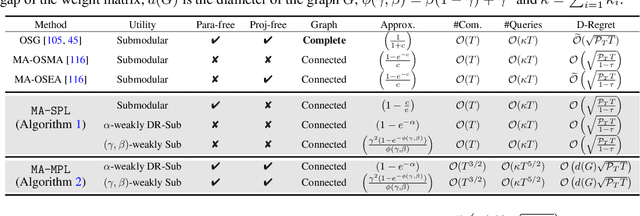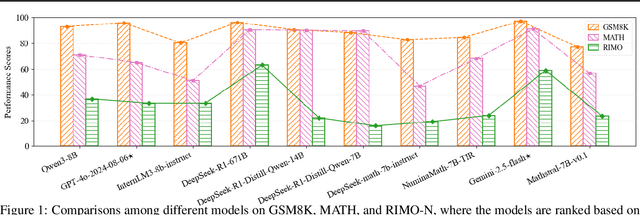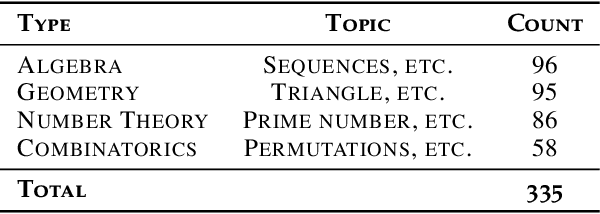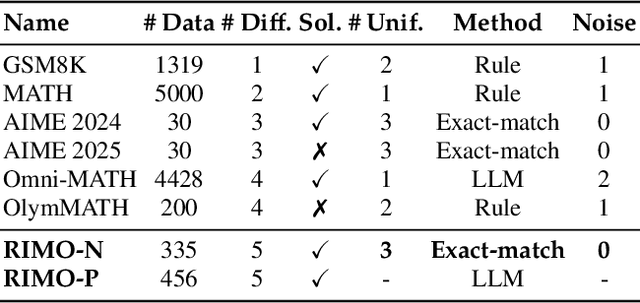Yao Shu
Training Multi-Turn Search Agent via Contrastive Dynamic Branch Sampling
Feb 03, 2026Abstract:Agentic reinforcement learning has enabled large language models to perform complex multi-turn planning and tool use. However, learning in long-horizon settings remains challenging due to sparse, trajectory-level outcome rewards. While prior tree-based methods attempt to mitigate this issue, they often suffer from high variance and computational inefficiency. Through empirical analysis of search agents, We identify a common pattern: performance diverges mainly due to decisions near the tail. Motivated by this observation, we propose Branching Relative Policy Optimization (BranPO), a value-free method that provides step-level contrastive supervision without dense rewards. BranPO truncates trajectories near the tail and resamples alternative continuations to construct contrastive suffixes over shared prefixes, reducing credit ambiguity in long-horizon rollouts. To further boost efficiency and stabilize training, we introduce difficulty-aware branch sampling to adapt branching frequency across tasks, and redundant step masking to suppress uninformative actions. Extensive experiments on various question answering benchmarks demonstrate that BranPO consistently outperforms strong baselines, achieving significant accuracy gains on long-horizon tasks without increasing the overall training budget. Our code is available at \href{https://github.com/YubaoZhao/BranPO}{code}.
1S-DAug: One-Shot Data Augmentation for Robust Few-Shot Generalization
Jan 27, 2026Abstract:Few-shot learning (FSL) challenges model generalization to novel classes based on just a few shots of labeled examples, a testbed where traditional test-time augmentations fail to be effective. We introduce 1S-DAug, a one-shot generative augmentation operator that synthesizes diverse yet faithful variants from just one example image at test time. 1S-DAug couples traditional geometric perturbations with controlled noise injection and a denoising diffusion process conditioned on the original image. The generated images are then encoded and aggregated, alongside the original image, into a combined representation for more robust FSL predictions. Integrated as a training-free model-agnostic plugin, 1S-DAug consistently improves FSL across standard benchmarks of 4 different datasets without any model parameter update, including achieving over 10% proportional accuracy improvement on the miniImagenet 5-way-1-shot benchmark. Codes will be released.
Controllable Concept Bottleneck Models
Jan 01, 2026Abstract:Concept Bottleneck Models (CBMs) have garnered much attention for their ability to elucidate the prediction process through a human-understandable concept layer. However, most previous studies focused on static scenarios where the data and concepts are assumed to be fixed and clean. In real-world applications, deployed models require continuous maintenance: we often need to remove erroneous or sensitive data (unlearning), correct mislabeled concepts, or incorporate newly acquired samples (incremental learning) to adapt to evolving environments. Thus, deriving efficient editable CBMs without retraining from scratch remains a significant challenge, particularly in large-scale applications. To address these challenges, we propose Controllable Concept Bottleneck Models (CCBMs). Specifically, CCBMs support three granularities of model editing: concept-label-level, concept-level, and data-level, the latter of which encompasses both data removal and data addition. CCBMs enjoy mathematically rigorous closed-form approximations derived from influence functions that obviate the need for retraining. Experimental results demonstrate the efficiency and adaptability of our CCBMs, affirming their practical value in enabling dynamic and trustworthy CBMs.
Effective Policy Learning for Multi-Agent Online Coordination Beyond Submodular Objectives
Sep 26, 2025



Abstract:In this paper, we present two effective policy learning algorithms for multi-agent online coordination(MA-OC) problem. The first one, \texttt{MA-SPL}, not only can achieve the optimal $(1-\frac{c}{e})$-approximation guarantee for the MA-OC problem with submodular objectives but also can handle the unexplored $\alpha$-weakly DR-submodular and $(\gamma,\beta)$-weakly submodular scenarios, where $c$ is the curvature of the investigated submodular functions, $\alpha$ denotes the diminishing-return(DR) ratio and the tuple $(\gamma,\beta)$ represents the submodularity ratios. Subsequently, in order to reduce the reliance on the unknown parameters $\alpha,\gamma,\beta$ inherent in the \texttt{MA-SPL} algorithm, we further introduce the second online algorithm named \texttt{MA-MPL}. This \texttt{MA-MPL} algorithm is entirely \emph{parameter-free} and simultaneously can maintain the same approximation ratio as the first \texttt{MA-SPL} algorithm. The core of our \texttt{MA-SPL} and \texttt{MA-MPL} algorithms is a novel continuous-relaxation technique termed as \emph{policy-based continuous extension}. Compared with the well-established \emph{multi-linear extension}, a notable advantage of this new \emph{policy-based continuous extension} is its ability to provide a lossless rounding scheme for any set function, thereby enabling us to tackle the challenging weakly submodular objectives. Finally, extensive simulations are conducted to validate the effectiveness of our proposed algorithms.
RIMO: An Easy-to-Evaluate, Hard-to-Solve Olympiad Benchmark for Advanced Mathematical Reasoning
Sep 09, 2025



Abstract:As large language models (LLMs) reach high scores on established mathematical benchmarks, such as GSM8K and MATH, the research community has turned to International Mathematical Olympiad (IMO) problems to push the evaluation frontier. However, existing Olympiad-level benchmarks suffer from practical constraints that introduce grading noise and potential bias, such as heterogeneous answer formats requiring model-based judges and a reliance on potentially flawed solutions. We introduce RIMO, a two-track benchmark designed to preserve peak Olympiad difficulty while eliminating this evaluation noise. The first track, RIMO-N, rewrites 335 IMO problems to admit a single, unique integer answer, allowing for deterministic correctness checking. The second track, RIMO-P, features 456 proof problems with expert-checked solutions, which are decomposed into a sequence of sub-problems to evaluate the step-by-step reasoning process via an automated grading system. Our benchmarking of ten frontier LLMs, including GPT-4o and Gemini 2.5 Flash, reveals that while these systems excel on older benchmarks, their performance drops sharply on RIMO. These results highlight a substantial gap between current LLM capabilities and actual Olympiad-level reasoning. By providing a challenging yet easy-to-evaluate suite, RIMO offers a high-resolution yardstick for future research, presenting a clear target for closing the profound reasoning gap our findings expose.
Zeroth-Order Optimization is Secretly Single-Step Policy Optimization
Jun 17, 2025



Abstract:Zeroth-Order Optimization (ZOO) provides powerful tools for optimizing functions where explicit gradients are unavailable or expensive to compute. However, the underlying mechanisms of popular ZOO methods, particularly those employing randomized finite differences, and their connection to other optimization paradigms like Reinforcement Learning (RL) are not fully elucidated. This paper establishes a fundamental and previously unrecognized connection: ZOO with finite differences is equivalent to a specific instance of single-step Policy Optimization (PO). We formally unveil that the implicitly smoothed objective function optimized by common ZOO algorithms is identical to a single-step PO objective. Furthermore, we show that widely used ZOO gradient estimators, are mathematically equivalent to the REINFORCE gradient estimator with a specific baseline function, revealing the variance-reducing mechanism in ZOO from a PO perspective.Built on this unified framework, we propose ZoAR (Zeroth-Order Optimization with Averaged Baseline and Query Reuse), a novel ZOO algorithm incorporating PO-inspired variance reduction techniques: an averaged baseline from recent evaluations and query reuse analogous to experience replay. Our theoretical analysis further substantiates these techniques reduce variance and enhance convergence. Extensive empirical studies validate our theory and demonstrate that ZoAR significantly outperforms other methods in terms of convergence speed and final performance. Overall, our work provides a new theoretical lens for understanding ZOO and offers practical algorithmic improvements derived from its connection to PO.
On Path to Multimodal Historical Reasoning: HistBench and HistAgent
May 26, 2025Abstract:Recent advances in large language models (LLMs) have led to remarkable progress across domains, yet their capabilities in the humanities, particularly history, remain underexplored. Historical reasoning poses unique challenges for AI, involving multimodal source interpretation, temporal inference, and cross-linguistic analysis. While general-purpose agents perform well on many existing benchmarks, they lack the domain-specific expertise required to engage with historical materials and questions. To address this gap, we introduce HistBench, a new benchmark of 414 high-quality questions designed to evaluate AI's capacity for historical reasoning and authored by more than 40 expert contributors. The tasks span a wide range of historical problems-from factual retrieval based on primary sources to interpretive analysis of manuscripts and images, to interdisciplinary challenges involving archaeology, linguistics, or cultural history. Furthermore, the benchmark dataset spans 29 ancient and modern languages and covers a wide range of historical periods and world regions. Finding the poor performance of LLMs and other agents on HistBench, we further present HistAgent, a history-specific agent equipped with carefully designed tools for OCR, translation, archival search, and image understanding in History. On HistBench, HistAgent based on GPT-4o achieves an accuracy of 27.54% pass@1 and 36.47% pass@2, significantly outperforming LLMs with online search and generalist agents, including GPT-4o (18.60%), DeepSeek-R1(14.49%) and Open Deep Research-smolagents(20.29% pass@1 and 25.12% pass@2). These results highlight the limitations of existing LLMs and generalist agents and demonstrate the advantages of HistAgent for historical reasoning.
PAFT: Prompt-Agnostic Fine-Tuning
Feb 18, 2025Abstract:While Large Language Models (LLMs) adapt well to downstream tasks after fine-tuning, this adaptability often compromises prompt robustness, as even minor prompt variations can significantly degrade performance. To address this, we propose Prompt-Agnostic Fine-Tuning(PAFT), a simple yet effective approach that dynamically adjusts prompts during fine-tuning. This encourages the model to learn underlying task principles rather than overfitting to specific prompt formulations. PAFT operates in two stages: First, a diverse set of meaningful, synthetic candidate prompts is constructed. Second, during fine-tuning, prompts are randomly sampled from this set to create dynamic training inputs. Extensive experiments across diverse datasets and LLMs demonstrate that models trained with PAFT exhibit strong robustness and generalization across a wide range of prompts, including unseen ones. This enhanced robustness improves both model performance and inference speed while maintaining training efficiency. Ablation studies further confirm the effectiveness of PAFT.
Refining Adaptive Zeroth-Order Optimization at Ease
Feb 03, 2025Abstract:Recently, zeroth-order (ZO) optimization plays an essential role in scenarios where gradient information is inaccessible or unaffordable, such as black-box systems and resource-constrained environments. While existing adaptive methods such as ZO-AdaMM have shown promise, they are fundamentally limited by their underutilization of moment information during optimization, usually resulting in underperforming convergence. To overcome these limitations, this paper introduces Refined Adaptive Zeroth-Order Optimization (R-AdaZO). Specifically, we first show the untapped variance reduction effect of first moment estimate on ZO gradient estimation, which improves the accuracy and stability of ZO updates. We then refine the second moment estimate based on these variance-reduced gradient estimates to better capture the geometry of the optimization landscape, enabling a more effective scaling of ZO updates. We present rigorous theoretical analysis to show (I) the first analysis to the variance reduction of first moment estimate in ZO optimization, (II) the improved second moment estimates with a more accurate approximation of its variance-free ideal, (III) the first variance-aware convergence framework for adaptive ZO methods, which may be of independent interest, and (IV) the faster convergence of R-AdaZO than existing baselines like ZO-AdaMM. Our extensive experiments, including synthetic problems, black-box adversarial attack, and memory-efficient fine-tuning of large language models (LLMs), further verify the superior convergence of R-AdaZO, indicating that R-AdaZO offers an improved solution for real-world ZO optimization challenges.
Meta-Prompt Optimization for LLM-Based Sequential Decision Making
Feb 02, 2025



Abstract:Large language models (LLMs) have recently been employed as agents to solve sequential decision-making tasks such as Bayesian optimization and multi-armed bandits (MAB). These works usually adopt an LLM for sequential action selection by providing it with a fixed, manually designed meta-prompt. However, numerous previous works have found that the prompt has a significant impact on the performance of the LLM, which calls for a method to automatically optimize the meta-prompt for LLM-based agents. Unfortunately, the non-stationarity in the reward observations during LLM-based sequential decision-making makes meta-prompt optimization highly challenging. To address this challenge, we draw inspirations from adversarial bandit algorithms, which are inherently capable of handling non-stationary reward observations. Building on this foundation, we propose our EXPonential-weight algorithm for prompt Optimization} (EXPO) to automatically optimize the task description and meta-instruction in the meta-prompt for LLM-based agents. We also extend EXPO to additionally optimize the exemplars (i.e., history of interactions) in the meta-prompt to further enhance the performance, hence introducing our EXPO-ES algorithm. We use extensive experiments to show that our algorithms significantly improve the performance of LLM-based sequential decision-making.
 Add to Chrome
Add to Chrome Add to Firefox
Add to Firefox Add to Edge
Add to Edge